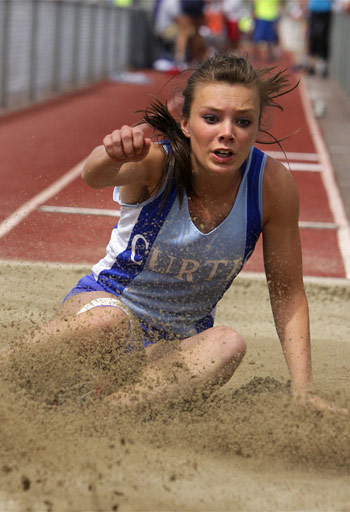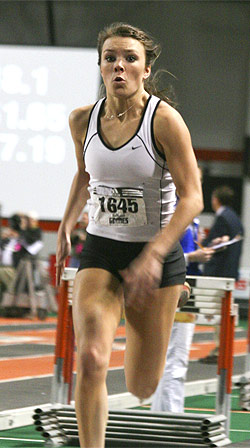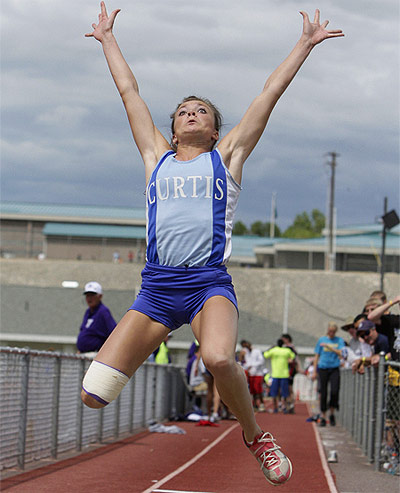 |
 |
 |
|
|
 |
 |
 |


Interval Session #114 - Andrea Geubelle
By Dave Devine - April 23, 2009
For the last year and a half, Curtis WA leaper Andrea Geubelle has been quietly making her case that the state of Washington should not be ignored when it comes to conversations about the best horizontal jumpers in the country. After a national title in the long jump at the 2008 USATF Junior Olympics, a pair of runner-up finishes in the jumps at the 2009 Simplot Games, a 2nd in the triple jump and 3rd in the long jump at the 2009 Nike Indoor Nationals, and a victory in the long jump paired with a second in the triple jump at this month's Arcadia Invite, that argument is exceedingly difficult to ignore. Currently ranked US#2 in the triple- and #3 in the long jump in DyeStat's TFX rankings, the soaring senior has big plans for the rest of 2009, including pursuing state records in Washington, pushing toward 44-feet in the triple jump and 21-feet in the long jump, defending her USATF Junior Olympic title and switching some of those silvers to gold at the other big post-season competitions.
DyeStat senior editor Dave Devine measures off the steps with the best girls' horizontal leaper in the Northwest.
|
|
 | Photo by Tyler Tjomsland
|
1) Congratulations on a great senior year so far! It's still fairly early in the outdoor season, but with your extensive indoor jumping campaign you've got quite a few big meets under your belt already. What's been your best competition so far, where you felt like you had your best jumps and the outcome you hoped for?
The Arcadia outdoor meet was definitely one of my best meets with the best outcomes. Here in Washington, we do not get the best weather to compete in, so when I got the opportunity, I had to take full advantage of it. I went to Arcadia knowing that I needed to put out a good mark to start my outdoor season off right. The second place in triple [jump] felt good, but good is never enough for me; I need to be great, so I continue to work hard to achieve that. As for the long jump, winning finally felt amazing, but that twenty is still lurking in the back of my head, and knowing you can do it feels good, but I need to get it on paper.
2) I know you've hit PRs in the long jump and the triple jump this year, but those elusive 42-foot and 20-foot barriers are still out there. Have you done anything differently this year than in past years, in order to make this push to the national elite level? Are you training differently, working on new techniques or focusing on different parts of the jumps, or are we just seeing the benefits of another year of maturity and experience?
Right now, I think you are just seeing another year of maturity and experience. My coach tells me daily that I am nowhere near my potential and that I need to work harder. So I have been lately, and he says he will put another two or three feet on my triple this year and another foot on my long, so I look forward to seeing what happens after some hard work. We are also working on speed. Here in Washington I am ranked in the top three in both the 100 and the 200, and I plan to take first at the state meet, so that should also help my long and triple. My coach, Nate Wilfred, has yet to be wrong in his three years of coaching me, but only time and hard work will tell, and I am ready to put myself to that challenge and start breaking some state records.
3) You were a USATF Junior Olympic national champion in the long jump last summer in Omaha. How did it feel to get that win, over some great jumpers like Karynn Dunn and Alitta Boyd? Was that the first national title you've ever won in the jumps, or have you won prior age group titles competing in club track?
No, that was the first major title that I won and it inspired me to work so much. It has also pressured me this year to hold that National title, and that would definitely complete my senior year. With hard work I can do it again, and with that competition it pushes me so much. I strive for competition. I love having it, and it pushes me to my max because I hate losing.
|

| Photo by Robert Rosenberg
|
4) At Nike Indoor Nationals, you were leading the triple jump until the very last jump by Ciarra Brewer. I know it must have been difficult to watch that national title slip away, although as a jumper you know it's always a possibilty if there's someone left in the flight. Can you talk about how you dealt with that disappointment and still managed to pull it together for a 3rd place effort in the long jump, and if that runner-up finish has motivated you in any way for outdoor track and the big summer meets ahead?
As I just mentioned, I hate losing. When I came back to Washington it was immediately back to work. Ciarra Brewer is a great jumper, and I enjoy competing against her because I know every meet we both attend is going to be great and full of competition, and it pushes the two of us to do our best. But she is also one of my targets. I strive day after day to be the best at both of my events, and I tell myself that I will be, but all that takes hard work and I strive daily to do my best. At the end of the day, my dad always tells me, “You can’t always look at the place you get, you have to look at how much you are improving by.”
5) When people think about "hotbeds" for track and field horizontal jumps, they don't necessarily think of Tacoma WA. Do you find it hard to match up against some of the top jumpers from California, Texas and the southern states, where they have weather and facilties that are perhaps more favorable to year-round training? Does being from the far Northwest of the country give you some anonymity when you go to these big national meets, because maybe your accomplishments are less well-known, or have you gone up against the top girls enough times now that everyone kind of knows everyone else?
It is definitely a disadvantage; at the beginning of the track season I was practicing in 28-degree weather and it was snowing. Then later on, our pits and runways were flooded due to the rain. This week we finally got some good weather and it is definitely exciting. As for the competition, here in Washington I have one girl in triple to push me, my teammate Savannah Johnson, who I won’t jump against until state. Those girls [from other states] get to jump against nationally ranked jumpers on a regular basis, but I think everyone has their obstacles. You must fight through them and mine have made me a stronger competitor. As for people knowing me, at first nobody did, but now I think we are all pretty familiar with each other.
6) I know you compete for the "Flying AJ's" club during indoor and post-season meets, and of course for Curtis HS during the outdoor season. Can you talk about the balance between those two teams, and how your coaching situation works out? Is there one primary coach from whom you receive most of your guidance in the jumps, and what's that relationship been like, in terms of your development as an athlete?
|

| Photo by Tyler Tjomsland
|
My club coach is also one of the high school coaches. His name is Nate Wilfred. He is one of the most amazing coaches in the nation, and has so many talents and so much knowledge about the sport. This is very obvious to see in that he has coached many national caliber athletes in Washington, such as Zach Smith, Savannah Johnson and Stephan Scott-Ellis. He has put Washington's name on the map for track and field, and is so much appreciated by all of his athletes. He spends his life at the track, and I would dedicate much of my success to him. I’m so grateful to have a coach like this, without him I would probably still be running the 800 and 400!!!
7) You've been excelling as both a triple jumper and a long jumper, but do you prefer one over the other? What's your favorite part about each horizontal jump?
I prefer triple, because there is so much more to improve on, and you see improvement in large numbers. What I enjoy most about long is that it is just one jump, and that’s all that matters. But success in both makes them both enjoyable.
8) I saw you were also a second-team all-league outside hitter for the Curtis volleyball team. Is it hard to balance the demands of preparing for a track season with the expecations of being a top volleyball player? Are there things about being an outside hitter that translate into what you do in training to be a top horizontal jumper?
It was hard to balance at first, because I kept getting injured in volleyball and my coach wanted to kill me. But it gives me something outside of track that at the same time benefits me in the jumps, so I think all in all it has made me better.
9) You mentioned you also have a job at a family-owned taco shop which keeps you busy outside of track. Are there any other hobbies or passions you enjoy off the track, or other clubs or groups you're particularly involved in at Curtis or your community?
I love my job; it is so fun to enjoy what you are doing and make money for yourself. It's made me grow up and learn to manage my time a lot, and on occasion got me in a lot of trouble for eating too many burritos and tacos!! I also have been a team captain of my school's relay for life team, which I am very interested in. It’s a great way to spend time with friends and help others at the same time.
|
Interval Sessions Index
|
|
|
|
|
 |
 |